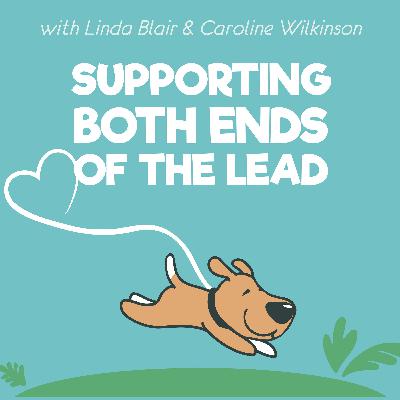Rethinking Habit
Description
In this thoughtful and encouraging episode, the hosts of Both Ends of the Lead return with a deep dive into the concept of habit - how it forms, how it affects both humans and dogs, and how we can consciously reshape habits to create less stress and more joy in our lives.
Caroline and Linda explore the three-part structure of habits (cue, response, reward), how stress and emotion influence behaviour, and how we can use shaping, positive reinforcement, and thoughtful awareness to change unhelpful patterns.
The episode also emphasises the interconnectedness of human and dog well-being and invites listener participation for future Q&A episodes via submitting their challenges at: https://www.speakpipe.com/bothendshttps://www.speakpipe.com/bothends
Main Points and Summary
Hosts are thrilled to be back and reconnecting with listeners.
The podcast focuses on mutual support for humans and their dogs.
Today's topic: rethinking habits - both positive and negative.
Habits are learned behaviours, not something we’re born with.
They form through repeated experiences in a specific environment.
Cited author: Charles Duhigg, The Power of Habit.
Habits consist of 3 parts:
Cue (Trigger)
Response (Behaviour)
Reward (Relief or Pleasure)
Important distinction: Rewards can be positive (treat, dopamine) or simply relief from stress or discomfort.
Habits can be mental, emotional, or physical and often occur without conscious thought.
Dogs form habits just like humans, and these can either support or hinder well-being.
Example: A dog pulls on the lead → human tightens it → dog gets some desired outcome (space, relief, etc.).
This creates a habit loop for both dog and guardian.
Emotional drivers like anxiety, fear, frustration often reinforce less helpful habits.
Stress impacts both decision-making and reaction times, often causing us to revert to ingrained habits.
When stressed, we bypass reasoning - important to slow down and reassess.
Professionals (trainers, coaches) provide outside perspective and can help navigate these emotional reactions.
Effective change is rarely immediate - it requires patience, consistency, and awareness.
For humans: Reward yourself for sticking to new behaviours, even in small ways (e.g., using a coin jar to reinforce your success).
For dogs: Focus on shaping behaviour gradually with positive reinforcement.
Example: Replace lunging with sniffing games or redirection using treats.
Be mindful of physical space, triggers, and arousal levels.
Important tip: When trying to replace an undesirable behaviour, the new behaviour must be equally or more rewarding to be effective.
Linda shared an example of asking her dog to “sit” when people approach.
Caroline explains this may bottle up emotion and lead to a more explosive release.
Alternative: Use movement-based redirection (scatter feeding, treat tosses) or create space from the trigger.
Strategy: Allow the dog to express energy in constructive ways rather than suppress it.
The hosts encourage listeners to submit challenges or questions for future podcast episodes.
Share stories or queries at speakpipe.com/bothends.
Contributions can be anonymous and will help tailor the podcast to audience needs.
Habits influence everything - from daily routines to emotional responses.
Awareness, understanding, and reshaping habits (for both dogs and people) can lead to calmer, more joyful lives together.
The road to change involves recognising emotional triggers and practicing more helpful behaviours, step by step.





